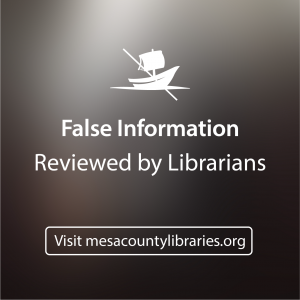
Every day we have tons of information thrown at us in a variety of ways and formats, from social media to T.V. to newspapers to books. It is important then, that we understand how to evaluate information and use it effectively in our lives. This process is called information literacy, which the American Library Association defines as: “a set of abilities requiring individuals to recognize when information is needed and have the ability to locate, evaluate, and use effectively the information.” Unfortunately, there is really no instantaneous way to determine if the information you’re consuming is true. However, the C.R.A.P Test is an excellent tool to help you evaluate the quality and factuality of the information you’re consuming. Clackamas Community College defines the C.R.A.P. Test as follows:
Currency
- When was the item written or created?
- How recently has the item been updated?
- Is the information current enough for your topic?
Reliability
- Is there a works cited or references list? Or links to outside sources?
- Does the creator provide references or sources data, quotations, or images?
- Is the information accurate and well-edited?
- Was the item reviewed by experts?
- What kind of information is included in the resource?
Authority
- Who is the creator or author?
- What are their credentials? Can you find any information about the author’s background, education, and/or experience?
- Who is the publisher, sponsor, or hosting website? Are they reputable? What is the publisher’s interest (if any) in sharing this information? What is on their “About Us” page?
Purpose/Point of View
- Is the information fact or opinion?
- Is the information biased? Do the author or publisher seem to be pushing an agenda or particular side?
- Is the author/publisher trying to sell you something? Are there advertisements? If so, are they clearly stated?
- Who is the intended audience? Is the author trying to reach experts, the general public, children, retirees, veterans, etc.?
- Does this resource require in-depth knowledge for you to understand? Does it use words or phrases that you might have to look up? Would it be confusing if you didn’t know anything about the topic?
It is also important to consider, when evaluating information, that your biases may unintentionally be affecting how you are perceiving the information. The Britannica Encyclopedia defines confirmation bias as: “the tendency to process information by looking for, or interpreting, information that is consistent with one’s existing beliefs. This biased approach to decision making is largely unintentional and often results in ignoring inconsistent information.” By seeking out other information that may not align with your beliefs, you will get a more well-rounded view of the information.
For more information on how to be a better consumer and producer of information, check out Season 3 Episode 2 of Mesa County Libraries’ podcast “The Audissey”, where Ike, Bethany, and Emmi go into depth on this topic.
